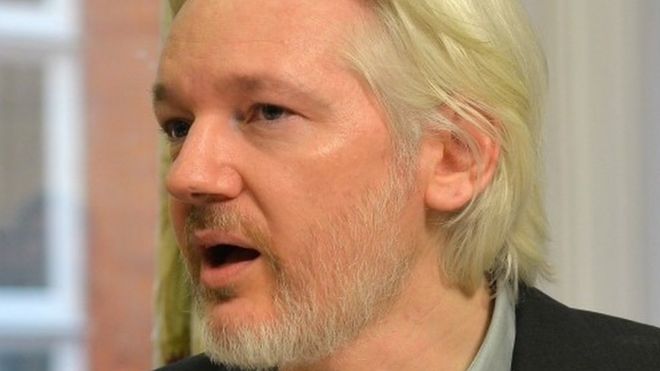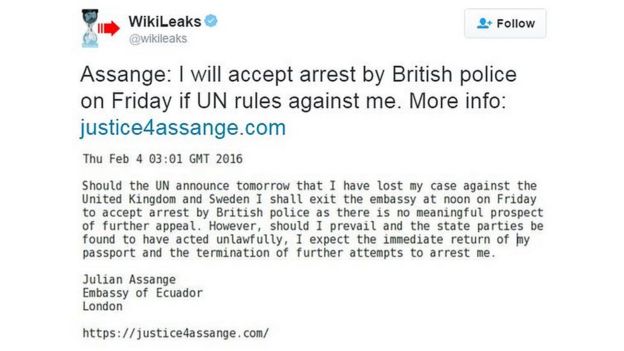
A UN panel has ruled Wikileaks founder Julian Assange is being "arbitrarily detained", the BBC understands.
Mr Assange claimed asylum in London's Ecuadorean embassy in 2012 to avoid extradition to Sweden over sex assault claims, which he denies.
The Met Police said he will still be held if he does leave the embassy.
He earlier tweeted he would accept arrest if the panel ruled against him, but called for his arrest warrant to be dropped if the decision went his way.
In 2014, Mr Assange complained to the UN that he was being "arbitrarily detained" as he could not leave the embassy without being arrested.
The UN's Working Group on Arbitrary Detention is due to announce the findings of its investigation on Friday.
While the BBC understands the panel will find in Mr Assange's favour, Wikileakstweeted it was waiting for "official confirmation".
The UK government said it would not "pre-empt" the ruling, saying Mr Assange still faced one allegation of rape while a European Arrest Warrant remained in place.
"We have been consistently clear that Mr Assange has never been arbitrarily detained by the UK but is, in fact, voluntarily avoiding lawful arrest by choosing to remain in the Ecuadorean embassy," a spokesman added.
"The UK continues to have a legal obligation to extradite Mr Assange to Sweden."
Analysis
 Getty Images
Getty Images
By Caroline Hawley, BBC diplomatic correspondent
There has been no official comment from either Sweden, Britain or the UN on the Working Group on Arbitrary Detention decision, which was taken in December and shared with both the Swedish and British governments.
In his complaint to the panel - made in 2014 - Julian Assange argued that living in 30 square metres of the Ecuadorian Embassy with no sunlight or fresh air had taken a "significant toll" on his physical and mental health.
Previous rulings by the panel have gone against countries with some of the world's worst human rights records, such as Saudi Arabia, Myanmar and Egypt.
So a decision against Sweden and Britain in favour of Mr Assange is bound to be controversial.
But it doesn't mean that he'll walk free. It's not legally binding. And British officials have made clear that the European arrest warrant against him remains in place.
The panel's decision is not legally binding on the UK or Sweden, Clive Coleman, BBC legal affairs correspondent said.
Mr Assange will argue the decision is significant and adds considerable legal and moral force to the argument he is being arbitrarily detained, he said.
But our correspondent added the UK government is likely to argue that Mr Assange's detention follows "an entirely lawful process".
Australian Mr Assange was originally arrested in London in 2010 under a European Arrest Warrant issued by Sweden.
He claimed asylum inside the Ecuadorian embassy in Knightsbridge after the UK Supreme Court ruled the extradition against him could go ahead.
Swedish prosecutors dropped two sex assault claims against Mr Assange last year. However, he still faces the more serious accusation of rape.

His Wikileaks organisation posted secret American government documents on the internet, and Mr Assange says he believes Washington will seek his transfer to the US if he is sent to Sweden.
In the statement, published earlier by Wikileaks on Twitter, Mr Assange said: "Should the UN announce tomorrow that I have lost my case against the United Kingdom and Sweden I shall exit the embassy at noon on Friday to accept arrest by British police as there is no meaningful prospect of further appeal.
"However, should I prevail and the state parties be found to have acted unlawfully, I expect the immediate return of my passport and the termination of further attempts to arrest me."
Last October, Scotland Yard said it would no longer station officers outside the Ecuador embassy following an operation which it said had cost £12.6m. But it said "a number of overt and covert tactics to arrest him" would still be deployed.
Julian Assange: Key dates
- August 2010 - Swedish prosecutors issue an arrest warrant for Mr Assange
- May 2012 - UK Supreme Court rules he should be extradited to Sweden to face questioning
- June 2012 - Mr Assange claims asylum in the Ecuadorean embassy in London
- September 2014 - Mr Assange submits complaint against Sweden and the UK to the UN Working Group on Arbitrary Detention
- August 2015 - Swedish prosecutors drop their investigation into two allegations - one of sexual molestation and one of unlawful coercion - but say he still faces the more serious accusation of rape.
- October 2015 - Met Police announce officers will no longer be stationed outside the Ecuadorean embassy
No comments:
Post a Comment